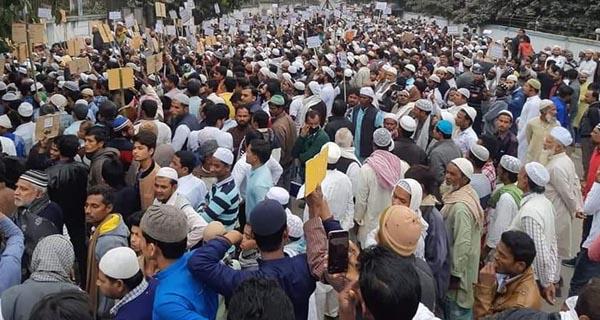–Soroor Ahmed
The issue of neglect of Muslims as such, especially the backward Muslims by secular parties arises every time elections are due. As Assembly poll is to take place in Bihar in coming October-November, and Rajya Sabha and Legislative Council elections held recently, stories related to the ‘mistreatment’ meted out to the community, especially the backward among them, are very much in circulation in the mainstream and social media.
Since there is little scope of Muslims getting due recognition and representation in the National Democratic Alliance–obviously because of the policy of its main constituent the BJP–all the blames of ignoring the community, or any of its section are put on the Rashtriya Janata Dal and Congress in Bihar and other secular parties elsewhere . A narrative is often being created that these secular parties do not give the minorities their due while distributing tickets and that they only exploit their compulsion. It is argued that these parties adopt the policy of use it and throw it.
However, this view is not always correct and is often spread by vested interest within the Muslim community and a section of media.
Take for example the case of the last Assembly election in which the RJD gave tickets to 16 Muslims when it put up candidates in 101 seats. Twelve of them won. The RJD won 80 of them. The percentage of Muslim population in Bihar is 16.9. Thus Muslim representation was very much in accordance with their population.
The alliance partner Congress fielded 10 Muslims out of 41 seats it contested–25 per cent. Six of them won. The Congress bagged 27 seats. The third partner of the Grand Alliance then, the Janata Dal United which also contested 101 seats, gave tickets to only seven Muslims out of which five won. One of the three CPI-ML MLAs is a Muslim. Thus the total number of Muslims in the House of 243 is 24.
The figure is still 24 but had in the last five years undergone minor changes, thanks to by-election. The JDU’s tally has gone down to four, RJD’s has increased to 13, Congress now has five legislators as All India Majlis-e-Ittehad-ul Muslimeen had snatched one seat in Kishanganj in a by-election last October.
The above fact suggests that even when in the Grand Alliance the Janata Dal United gave ticket to just seven per cent Muslims. In the coming election it may end up giving ticket to even lesser number of Muslims as it is now in alliance with the BJP.
In the last Lok Sabha poll RJD gave tickets to five Muslims when as a Grand Alliance partner it contested only 19 out of 40 seats in Bihar. Thus Muslims got 27 per cent representation, that is, more than 10 per cent of their population in the state.
The Congress which as Grand Alliance partner fielded nine candidates–two of them were allotted to Muslims–which is more than 20 per cent.
It needs to be mentioned that between 2010 and 2015 seven out of 22 RJD MLAs were Muslims. Strangely, barring Akhtar-ul Iman, who was then in RJD, the rest six won from the seats having Hindu majority.
Contrast this with the recent development in Bihar when Tariq Anwar of Congress had to be replaced by Sameer Singh at the final moment of the Legislative Council poll as his name was not in the voters’ list of the state, a section of media and disgruntled Muslim politicians started screaming that look how the secular parties are humiliating the community. They would never say anything when these very parties gave more seats to Muslims than the percentage of their population.
Similarly whenever the Janata Dal United would give ticket to a backward Muslim and RJD to any so-called upper caste Muslim–as it had happened in the recent Legislative Council poll–the media would go the whole hog in clamouring that look how Lalu Prasad is repeatedly ignoring the weaker section of Muslims.
While the Janata Dal United once again gave the Council seat to Ghulam Ghous, a backward caste leader, from the RJD side a political new comer Farooq Sheikh entered the Upper House of Bihar Assembly. What those who are screaming now failed to appreciate is the fact that Ghulam Ghous was initially hand-picked by RJD chief Lalu Prasad and sent to Legislative Council when he was a political green horn about two decades back. In 2011 he went on to become the leader of opposition in the Council. It was Ghous who on the eve of 2014 Council poll crossed over to Nitish Kumar’s party
Ghous is the nephew of now late Ghulam Sarwar, the Speaker of the Bihar Assembly during the first tenure of the Lalu regime between 1990 and 1995. He is also related to Dr Ejaz Ali, former Rajya Sabha MP of Janata Dal United and the leader of the erstwhile Backward Muslim Morcha.
Dr Ali is the son in law of Ghulam Sarwar. Lalu preferred Ghous over Ali as he was reportedly not pleased with the way the former was creating division among Muslims, that too when the graph of the BJP was constantly on the upswing.
There is no doubt that upper caste Muslims dominate politics in different parties. Yet this does not mean that the secular parties have totally ignored them. Even Dr Ali Anwar, who later became the Rajya Sabha MP of the Janata Dal United before being kicked out of the party by Nitish, was initially close to Lalu.
The misgivings about the ‘poor’ representation to Muslims or the backward Muslims are often spread by media or leaders like Akhtar ul Iman, M A A Fatmi, Dr Shakeel Ahmed etc after they had played their innings in the same very secular parties. It is they, who, with the help of media, try to confuse the common Muslims. Usually these leaders get exposed in the poll.
(The writer, a senior journalist, is based in Patna. The views are personal.)





